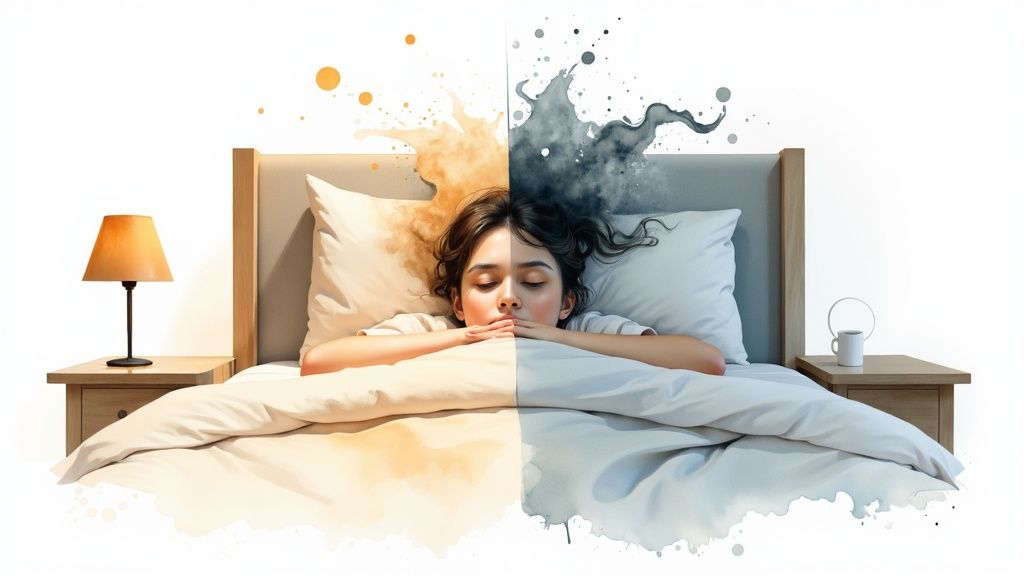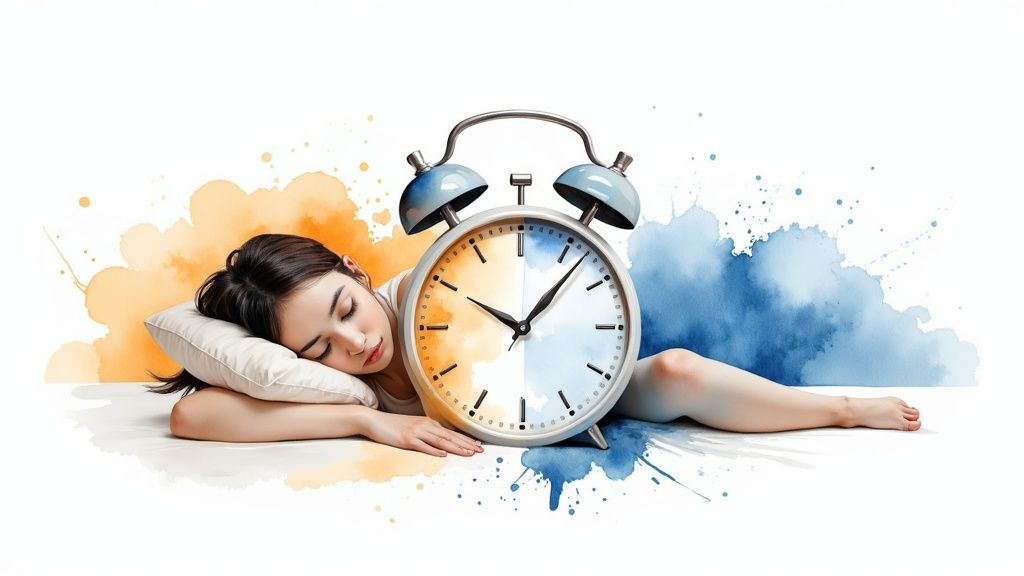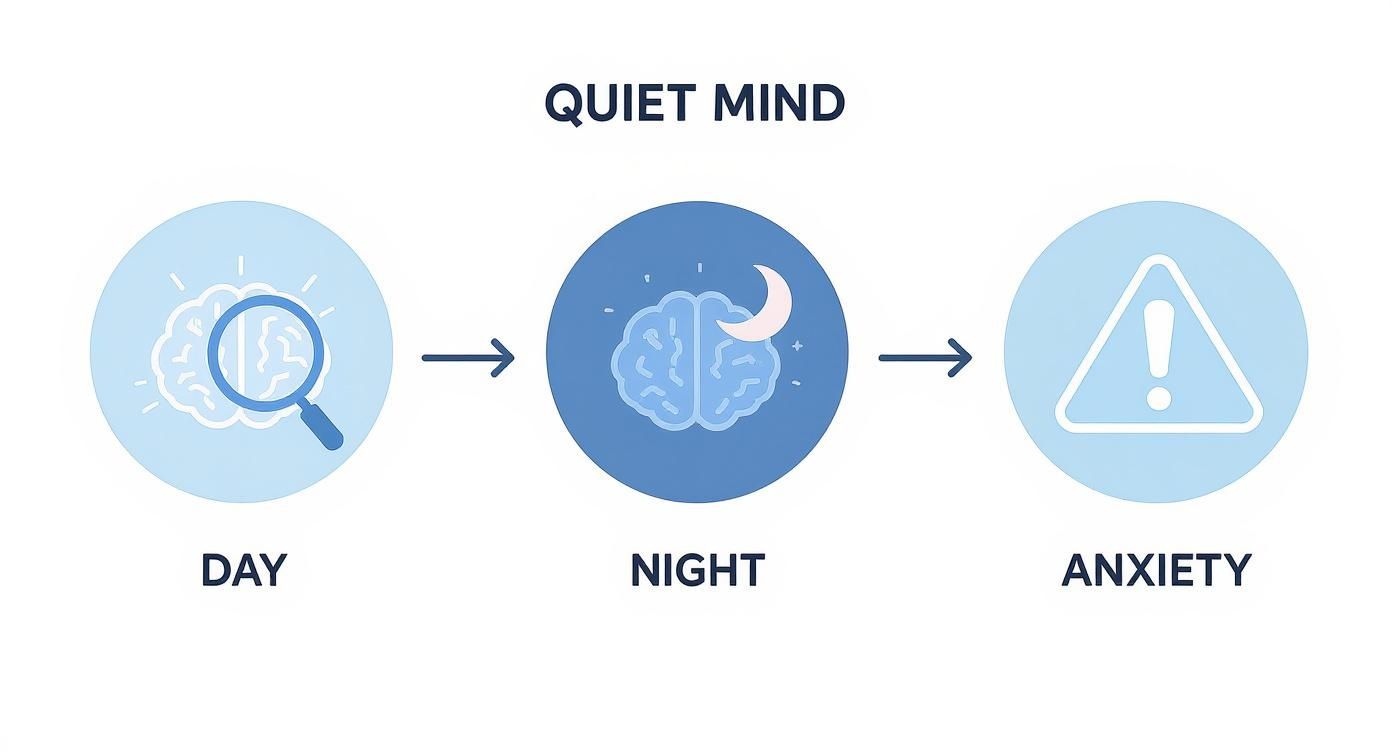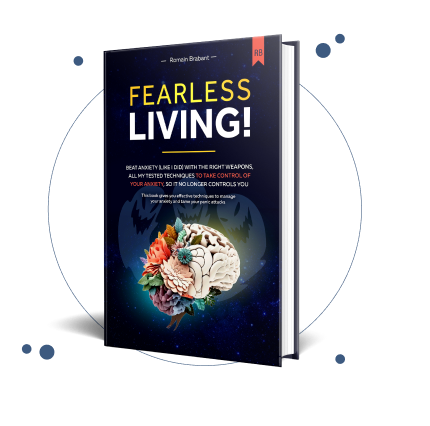
It's a familiar story: you get through the day feeling mostly fine, only for a wave of worry to wash over you the moment your head hits the pillow. It’s frustrating, exhausting, and incredibly common. This isn't just in your head; as the day’s noise and distractions fade, your mind suddenly has a wide-open space for anxious thoughts to rush in. At the same time, natural hormonal shifts can leave you feeling more exposed and vulnerable. But understanding this pattern is the first step toward healing it, and a panic-free life is absolutely possible.
The Nightly Shift From Calm to Anxious

If it feels like your anxiety has a personal vendetta against your sleep, you’re not alone. This pattern isn’t a personal failing. It’s a common experience rooted in your body's natural rhythms and the profound quiet of the evening—and it's a cycle you can learn to break.
During the day, your brain is a master juggler—handling tasks, conversations, and an endless stream of external stimuli. All that activity acts as a buffer, pushing intrusive worries to the background. But when night falls and the world goes quiet, that buffer vanishes.
Suddenly, the worries that were simmering just beneath the surface have the space to take center stage. This isn't a sign that things are getting worse; it's just a sign that your mind is seeking direction. With the right tools, you can guide it toward peace.
Understanding the Key Factors
This nightly spike in anxiety is driven by a mix of biological, mental, and environmental factors that turn up the volume when everything else quiets down. Here's a quick look at what's happening behind the scenes.
Why Your Anxiety Spikes When the Sun Goes Down
| Factor Type | What Happens at Night | How It Intensifies Anxiety |
|---|---|---|
| Biological | Cortisol (stress hormone) levels are supposed to drop to prepare you for sleep. | Chronic stress and anxiety can disrupt this, keeping cortisol levels elevated and your body on high alert. |
| Mental | Daytime distractions (work, family, chores) disappear, leaving your mind with fewer places to go. | Without external focus, your brain defaults to internal worries, unresolved problems, and "what-if" scenarios. |
| Environmental | The darkness and silence of nighttime can create a sense of isolation and vulnerability. | This lack of sensory input can make internal fears feel larger and more immediate, triggering a primal sense of unease. |
These factors create a perfect storm, leaving you feeling wired and worried when you should be winding down. Understanding this interplay is the first step toward breaking the cycle and healing.
Your body's internal clock, or circadian rhythm, is a major player here. It's supposed to signal a drop in cortisol—a key stress hormone—in the evening to prepare you for rest. But when you’re anxious, that process can get thrown off track. If you want to dig deeper, you can explore our guide on the most common anxiety triggers.
This disruption can lead to a frustrating spike in nighttime anxiety. And unfortunately, while effective treatments exist, studies show that only about 27.6% of people with anxiety get any kind of care, which can make the condition’s impact on daily life even worse.
The most important thing to remember is that this cycle is understandable and, more importantly, breakable. Understanding why your anxiety gets worse at night is the first, most hopeful step toward reclaiming your peace.
Throughout this guide, we'll explore these mechanisms in detail—from the role of stress hormones to the power of a restless mind. Our goal is to empower you with knowledge, assuring you that living a life free from panic is not just a dream but an achievable reality.
How Your Body Clock Fuels Nighttime Anxiety

One of the biggest reasons anxiety seems to spike after dark is biological. It all comes down to your internal body clock, also known as your circadian rhythm. Think of it as your body's 24-hour operating system, managing everything from your energy levels to when certain hormones get released.
This internal clock is designed to follow a beautiful, natural cycle. When the sun goes down, it signals your brain to ramp up melatonin (the sleep hormone) while telling your adrenal glands to dial back cortisol (the primary stress hormone). This hormonal handoff is what helps you feel calm, relaxed, and ready for a restorative night's sleep.
But chronic stress and anxiety can throw a major wrench in this delicate system. Instead of cortisol levels dropping like they should in the evening, they can stay stubbornly high. This keeps your body stuck on high alert precisely when it needs to be winding down.
The Cortisol Connection
This isn't just a feeling; it's a physiological fact. When your cortisol is elevated at night, it puts your nervous system on guard duty. This makes you far more vulnerable to racing thoughts and the physical sensations of anxiety, like a pounding heart or tense muscles.
Your body is essentially getting a signal that says, "Stay awake! Be vigilant!"—a message that directly contradicts your need for rest.
This biological mismatch explains why your sleep schedule is so incredibly important for your mental health. Research from Stanford University found that "night owls" had a 20% to 40% higher likelihood of being diagnosed with a mental health disorder, including anxiety, compared to early birds. It shows that being awake late at night isn't just a preference; for some, it's a significant risk factor. You can dive deeper into how sleep patterns affect mental health with Stanford Medicine.
Understanding this connection is incredibly empowering. It shows that your nighttime struggles aren't a sign of weakness but a sign of a dysregulated system—a system you can absolutely learn to influence and heal.
When you start focusing on strategies that support your natural circadian rhythm, you can help restore that crucial hormonal balance. Simple lifestyle and diet changes for anxiety management can send a powerful signal of safety to your body, encouraging cortisol to back off and paving the way for calm, panic-free evenings.
Why Your Mind Gets Louder When the World Goes Quiet
During the day, your mind is a master of distraction. It’s busy juggling work deadlines, family schedules, and an endless stream of texts, emails, and notifications. All this activity acts like background noise, effectively drowning out the deeper, more persistent worries.
But when night falls and the world around you goes silent, that buffer vanishes. The quiet doesn't invent new anxieties; it just gives the ones that were there all along the spotlight they've been waiting for.
From Distraction to Rumination
Think of your daytime mind like a busy party. With music playing and conversations flowing, you barely notice the quiet hum of the refrigerator. But once the guests leave and the music stops, that hum suddenly feels like the loudest sound in the room.
This is precisely what happens with your thoughts. Without external distractions to grab your focus, your mind can easily slip into old, unhelpful habits. This is where rumination takes over—that frustrating mental loop where you endlessly replay past events or get stuck in "what if" scenarios about the future. This is a natural pattern for an anxious mind, not a sign that you're weak.
You can learn more about how to break this pattern in our detailed guide on overthinking and anxiety.
Recognizing this shift is the first step toward reclaiming your nights. Your mind isn’t broken; it's just following a well-worn path in the absence of other directions. The hopeful truth is that you can learn to create new, calmer paths.
Understanding this dynamic is crucial. It shows that the problem isn't the silence itself, but what your mind does with that silence. This insight is your starting point for learning the tools to gently guide your thoughts, quiet the inner noise, and finally get the peace you deserve. A panic-free life is entirely possible.
The Vicious Cycle of Poor Sleep and High Anxiety
Anxiety and poor sleep are tangled up in a frustrating feedback loop. When anxiety keeps you staring at the ceiling, the sleep deprivation that follows just makes you more susceptible to anxiety the next day. It’s a downward spiral that can feel overwhelming, but the good news is that you can intervene at any point in the cycle to start making positive changes.
When you miss out on deep, restorative sleep, it directly impacts your brain's emotional control center, the amygdala. Think of it like trying to start a stressful day with your phone battery at 1%; you have no internal resources left to handle what's coming.
This leaves your internal alarm system on a hair trigger, ready to overreact to the smallest thing. Suddenly, a minor stressor feels like a catastrophe, setting off your body’s stress response. You can learn more about this in our complete guide to the fight-or-flight response.
The Fear of Not Sleeping
The cycle gets even trickier when the fear of not being able to sleep becomes its own source of anxiety. You lie in bed, watching the clock tick by, and start dreading how exhausted you'll feel tomorrow. This performance anxiety around sleep only adds more fuel to the fire, pushing sleep further out of reach.
This visualization breaks down how the worries of a busy day can feel so much bigger at night, ultimately triggering an anxiety response.

The real insight here isn’t that the quiet of the night creates anxiety. Instead, it amplifies the pre-existing worries that you were able to manage while the sun was up.
This two-way street between anxiety and insomnia is well-documented. During the mid-2020 pandemic, for instance, insomnia rates hit almost 48.79% in some groups, feeding directly into the intensity of nighttime anxiety. When sleep just won't come, the mind starts to race.
Pointing out this cycle isn’t meant to give you one more thing to worry about. It’s about showing you a clear—and hopeful—path forward. Getting a handle on your sleep is one of the most powerful things you can do to manage anxiety and take back your nights.
Sometimes, the foundation of better sleep is… well, your actual foundation. If your bed isn't comfortable, it's not doing you any favors. Learning how to choose a new mattress for better sleep can be a game-changer in creating a truly restful space. Remember, a panic-free life is absolutely within your reach.
Actionable Steps to Reclaim Your Nights and Heal

Knowing why anxiety spikes at night is the first step, but real change comes from taking gentle, consistent action. The goal isn't to wrestle your anxiety into submission. It's about creating the right conditions for your mind and body to find calm naturally.
Believe it or not, peaceful nights are absolutely within your reach. It starts with small, sustainable habits you can build, starting tonight. This isn't about adding more to your plate. It's about sending signals of safety to your nervous system, managing those intrusive thoughts, and turning your bedroom back into a true sanctuary.
Design a Calming Wind-Down Ritual
Think of a wind-down ritual as a clear signal to your body and mind that the day is over and it's time to rest. When you do it consistently, your brain starts to automatically associate these activities with sleep. It's powerful stuff.
- Disconnect Deliberately: Put your phone and other screens away at least 30-60 minutes before bed. It's not just about the blue light messing with your melatonin; it's about the content that keeps your brain buzzing.
- Embrace Gentle Activities: Swap endless scrolling for something that calms you. Pick up a physical book, listen to some chill music, or try journaling. Getting your worries down on paper can feel like physically removing them from your head.
- Practice Mindful Breathing: Your breath is a direct remote control for your nervous system. Simple breathing exercises for anxiety can slow your heart rate, release muscle tension, and send a powerful "all is well" message to your brain.
Remember, a wind-down ritual isn't a chore—it's an act of self-compassion. It's you dedicating time to your own peace and well-being, proving to yourself that rest is a priority.
Craft a True Sleep Sanctuary
Your bedroom environment has a massive impact on your nightly anxiety levels. The idea is to make it a space only for rest and intimacy, completely separate from the day's stressors. This reinforces the mental link between your bed and sleep.
Keep your room cool, dark, and quiet. Things like blackout curtains, a white noise machine, or even a good pair of earplugs can make a world of difference.
When you optimize your physical space, you create an external environment that encourages internal calm. Understanding what causes insomnia and what you can do to help is a huge part of breaking this cycle and taking back your nights. These small tweaks really can have a profound impact on your sleep and, in turn, your anxiety.
Got Questions About Nighttime Anxiety?
If you’re wrestling with anxiety when the lights go out, you’re bound to have questions. Getting clear, honest answers is a huge part of feeling in control again. It reminds you that you’re not alone in this and that peaceful nights aren't just a fantasy—they’re possible.
Let's tackle some of the most common concerns.
Can My Diet Really Affect My Anxiety at Night?
Absolutely. What you eat and drink has a direct line to your nervous system.
Stimulants like caffeine, even from your mid-afternoon coffee, can linger for hours, disrupting your natural sleep cycle and leaving you feeling wired and on edge. A heavy or sugary meal right before bed can also cause physical discomfort—like indigestion or a spike in blood sugar—that your anxious brain might misinterpret as a threat, making it almost impossible to relax. Making gentle adjustments here can be an empowering act of self-care that supports calmer nights.
Is It Normal to Wake Up in the Middle of a Panic Attack?
It’s terrifying, but yes, it’s a recognized experience for people with anxiety disorders. Waking up in a full-blown panic attack often happens as your brain shifts between sleep stages.
While the physical feelings are overwhelming—the racing heart, the shortness of breath—they aren't dangerous. It’s a sign that your nervous system is stuck on high alert. But it's also something you can learn to manage with grounding techniques, proving you have the power to bring yourself back to a state of calm.
Reaching out for help isn’t a sign of failure. It's the most courageous step you can take toward getting your life back. A panic-free life isn't a distant dream—it's an achievable reality.
When Is It Time to Get Professional Help?
If your anxiety is consistently ruining your sleep, draining your energy, and impacting your daily life, that's your cue. Seeking professional support is a powerful move toward reclaiming your peace of mind and accelerating your healing.
A therapist can offer proven, evidence-based treatments like Cognitive Behavioral Therapy (CBT). Taking this step doesn't mean you've failed; it means you're ready to arm yourself with the right tools to fast-track your journey back to a life that isn't defined by anxiety.
At The Anxiety Checklist, we believe everyone deserves to live a life free from fear. Our system gives you a practical, step-by-step roadmap to understand your anxiety, manage panic, and build lasting resilience for peaceful nights and brighter days. Start your journey to fearless living today.

